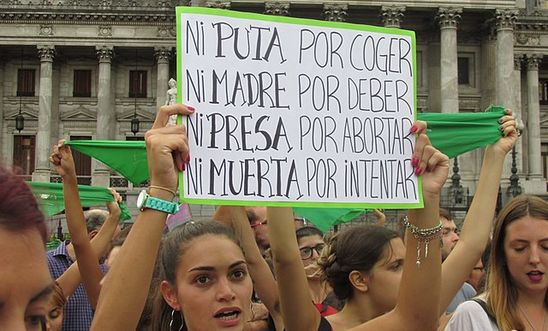
Argentina's fight to legalise abortion is far from over.

On August 8, Argentina’s Senate held the deciding vote on decriminalising abortion. Unfortunately, they voted to reject the draft bill to legalise voluntary termination of pregnancy during the first 14 weeks.
In other words, the senators who voted against this or abstained have decided to agree on a system which forces women, girls and others who can become pregnant to undergo clandestine and unsafe abortions.
Missed opportunity
Less than a month after Ireland’s history-making vote to decriminalise abortion, the streets of Argentina were home to incredible scenes of people protesting and calling on their Congress to bring them one step closer to having safe and legal abortion.
Women and girls camped outside as the Chamber of Deputies debated (long into the night) a bill that would allow for abortion up to 14 weeks. Finally, on the morning of June 14, the bill narrowly passed - a result that would have been unthinkable even one year ago.
In a country where abortion has been severely restricted, the national debate around abortion has shattered the silence on an issue that has long been seen as taboo.
On August 8, the Senate had the deciding vote on whether this bill would become law. Their decision is a huge step backwards for sexual and reproductive rights.
Why does this matter?
Access to safe abortion is a human right. Yet in Argentina access to abortion continues to be illegal and is only available to women whose life or health is in danger, or where the pregnancy is the result of rape.
However, in practice many pregnant women are denied the procedure, and are forced to seek out alternatives. An estimated 500,000 abortions occur every year in Argentina, representing an estimated 40% of all pregnancies.
It continues to be the number one cause of maternal deaths in the country for the past 30 years, an even more shocking fact given how developed Argentina’s health system is.
Over the last 60 years, more than 30 countries have changed their laws to allow for greater access to abortion, at times recognising the vital role that access to safe abortion plays in protecting pregnant women’s lives and health.
The national debate in Argentina has stood as a beacon of hope for the rest of Latin America, where currently only Cuba, Uruguay and Mexico City have legalised abortion.
Women and girls across the region have voiced solidarity with women in Argentina, with signs that the campaign is spreading: in late July, thousands of people took to the streets of Santiago, Chile, wearing the green scarves that have been the symbol of activists in Argentina, as they demanded an overhaul of restrictive abortion laws.
This is not the end
Many have credited the national vote on abortion to the vibrant movement Ni Una Menos (Not One Less), led by women and girls. The movement was a response to the horrific rates of brutal killings and untimely deaths (femicides) of women and girls in Argentina.
Many of the women involved in the #NiUnaMenos rallies quickly became aware of how the longstanding ban on abortion was contributing to the deaths of so many women and girls. Now, more people than ever before are talking about abortion and sharing their stories and experiences.
The “green wave”, so-called because of the green scarves and clothing that activists have chosen to wear, has undoubtedly created momentum for reproductive rights advocates to build on. The power of women’s collective organising became obvious when President Macri made the unprecedented announcement in March that he would not try to veto the decision on the abortion bill, even though he opposed it.
This is not the end. Argentina will see the “green wave” returning to the streets over and over again, keeping up the pressure on lawmakers until they finally allow for safe and legal abortion.